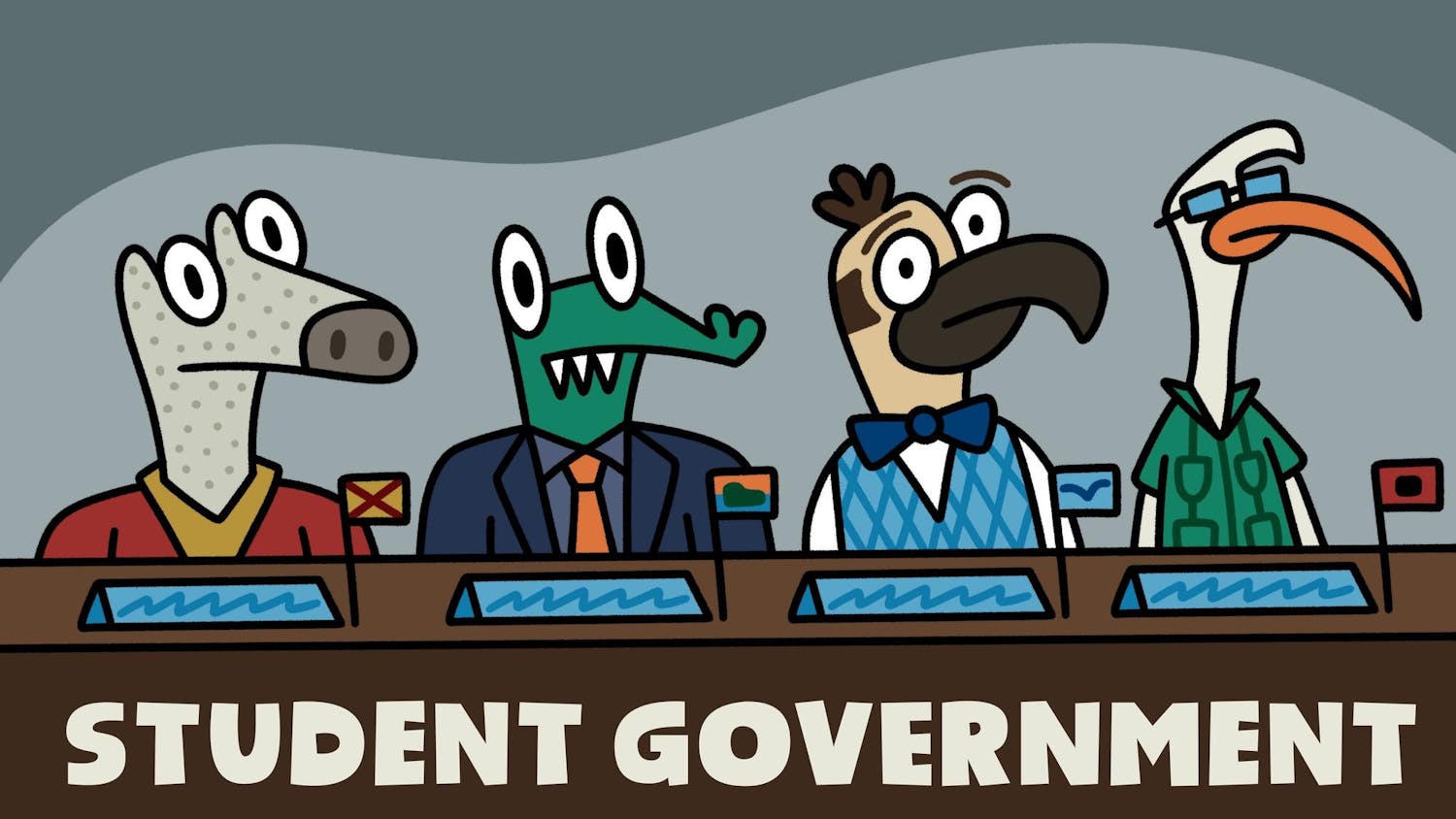I grew up in the Dunedin-Clearwater area, and one of the parks in Safety Harbor I frequented had an “Indian mound.” I didn’t know the weight of its meaning until I was much older, and Tocobaga was a name that had hardly ever crossed my mind at all.
Fighting for land acknowledgments at UF has been a battle up a much steeper, larger mound than the one in Safety Harbor.
When I joined Student Government as the senator representing the College of the Arts in 2021, I was elated to meet Jonathan C. Stephens and see they were working on getting land acknowledgments in more on-campus spaces.
I remembered the first time the School of Theatre and Dance (SoTD) did one — the way I felt hearing the names of the actual tribes whose land we were on. I had never heard of the Timucua people or Potano tribe before, and neither had others in the room.
This is why I wrote my most personal and researched bill, SSB2022-1059: Resolution Commemorating November as American Native Heritage Month after very little success in our work advocating for land acknowledgments. It had 14 sponsors. Fourteen people within our student Senate bothered to take a second to toss their names on a list of people in support of the bill.
This bill originally included a clause pushing for expanded land acknowledgments at UF. The senators in the judiciary committee at the time removed it, gutting my bill. Without including a statement supporting further usage of land acknowledgements, the bill became a compilation of information with no real call to action.
I had hand-copied the individual names of over 135 tribes whose land was stolen in the Morrill Act of 1862 simply for a few students to look at them and do nothing about it. One student broke party lines and three or four others followed his lead when I put forth an amendment adding my clause back in.
The amendment adding back the single most important clause in my whole bill was one vote away from passing. This was the first time I cried during Senate, silently, toward the back of the chamber.
There was then a bill requiring a land acknowledgment to be given by SG officials at certain events, which was vetoed by UF Student Body President Olivia Green, then overturned with well over 2/3 by the Senate, and finally vetoed by vice president of student life Heather White. This was when it finally died. In several statements, SBP Green said she was interested in “incorporating this into her administration” as damage control, but during the event I specifically advocated for including a land acknowledgement in (the State of the Campus Address, one of/the only time the executive branch publicly speaks), she never gave one. At the address she attested that her administration had a policy to “put the student first.” Is this putting the at least 0.24% of students who identify as “American Indian or Alaska Native” first?
I ask the individuals who overturn these initiatives or have stood as a barrier in our advocacy to reflect on these questions: What is so upsetting about taking a minute to give a name to the people whose land was taken? Why have you never given one? The reason why we’ve fought so hard to enact policy mandating land acknowledgements is plain and simple: if they are not required, they are not given.
In the spirit of acknowledgment, I’m a first-generation Canadian-American of Mi’kmaq and Beothuk descent, very largely disconnected from the First Nations office over 2,200 miles away in Newfoundland. I very much identify as white, especially in America where most Indigenous tribes look very different from me. There’s a heavy, distant connection to a heritage I don’t know much about. I'm not included in the statistic of 0.24% of students because I don't self identify.
There’s a lot to be said about the “Indian mound” we’ve been forced to climb in order to get the bare minimum. With the fact that the mound in Safety Harbor was a burial mound, and the fact that the University of Florida holds over 2,000 unrepatriated ancestral remains in Dickinson Hall, the Western narrative of homogeneity among Indigenous people needs to be disrupted in order to help alleviate errors like this. The amount of research required to repatriate these remains is far larger due to the fact that there was likely no care for tribal affiliation when they were collected. The conceptual extinction of these individuals is often made light of, but for a lot of us, their memory weighs heavy on us as we try to walk uphill towards a decolonized world.
Please keep an eye out for Minorities in Agriculture, Natural Resources, and Related Sciences (MANRRS), Society for Advancement of Chicanos and Native Americans in Science (SACNAS), and the aforementioned American Indian in Science and Engineering Society (AISES), student organizations that support Indigenous students’ professional development and overall well-being.
I encourage us all to reflect carefully about how we can honor, support, and uplift Indigenous communities this month. Happy Native American Heritage Month.
Cassie Urbenzis the Communications Co-Chair of UF Graduate Assistants United (GAU) and a first-year Design & Visual Communications (MFA/MxD) graduate student.






